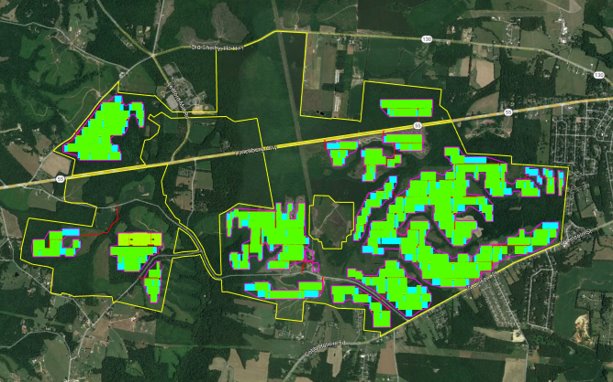
LYNCHBURG, Tenn. — Wednesday’s solar farm Q&A hosted by Silicon Ranch was a mixed bag. Some citizens left as upset as they were when they arrived, and others seemed to depart Moore County High School a bit more at ease.
Nearly 50 locals showed up to what was merely a courtesy from Silicon Ranch. The solar farm has received all local, state, and federal permits necessary to proceed with their project and nothing said in Wednesday night’s Q&A session would change that.
The Times learned about the meeting over a month ago, and posted multiple public meeting reminders on our social media channels. Those reminders sparked a lively discussion. So, the day after the meeting, we revisited those Facebook comments and compared them to some of the answers, Silicon Ranch officials gave last night.
{EDITOR’S NOTE: Just as a reminder, this article isn’t intended to confirm or argue against any opinion. We are simply relaying the information given at Wednesday’s meeting for those who could not attend.}
Silicon Ranch clear-cut the land. As The Times explained when we broke the news of the new Moore County solar farm back in April 2021, the previous owner, the Cumberland Springs Land Company, cut about two-thirds of the trees prior to the sale to Silicon Ranch. It did so to harvest thousands of nearly 100 year old white oak trees that went to making barrels, furniture, and flooring. White oaks, like those used locally to produce whiskey barrels, have a long maturation period. That’s why they’ve been growing undisturbed for decades. The land sold to Silicon Ranch had been previously logged and burned in the 1940’s and used as an artillery range as part of Camp Forrest during WWII. {To read our original coverage, click here.}
Home prices will decrease. During the Q&A session, Silicon Ranch introduced area realtor Brad Mansfield who stood before the audience to discuss an independent study he’d performed at Silicon Ranch’s request to evaluate property values near solar farms. A copy of the 85-page report was available for citizens to “thumb through” on Wednesday.
“I analyzed eight projects in Tennessee and evaluated nearly $1 million in real estate transactions and found a about a three percent swing either way,” he told the group.
A Mother Jones article from March of this year quotes new research from the Lawrence Berkeley National Laboratory (LBNL) – a federally funded research and development center sponsored by the United States Department of Energy. The study found that houses within a half-mile of a utility-scale solar farm have resale prices that are, on average, 1.5 percent less than houses that are just a little farther away. You can read that article in it’s entirety by clicking here.
Moore County doesn’t benefit. During the meeting, Silicon Ranch’s Morey Hill stated that the Moore County solar farm will generate an estimated half a million to the local tax base. They did not provide a breakdown of that money.
As we originally reported in 2021, in addition to the capital investment, the solar farm’s construction will also produce around 500 construction jobs. Also, Silicon Ranch will purchase, not lease, the land meaning an immediate bump in property tax revenues. As a Independent Power Producer (IPP), Silicon Ranch does not qualify as a public utility, and therefore, according to the company, will pay property taxes over the life of the project.
“All with minimal use of local infrastructure such as roads and schools,” Hill stated.

It will be an eyesore. Silicon Ranch explained on Wednesday that they went through all the necessary permitting processes to get their site plan approved including multiple appearance before the Metro Planning Commission as well as the Board of Zoning Appeals. Per local ordinances, lots of agricultural buffering was added to protect area homeowners. Also, only around 1,200 acres of the total 3,400 acres purchased by Silicon Ranch will be used for solar panels.
“A little more than one third of the site we have purchased will be fenced for the actual solar array, Silicon Ranch Director of Corporate Communications Rob Hamilton told The Times after the meeting. “As we do with all properties that we own and manage, our intent will be to preserve and conserve the balance of the property as part of a comprehensive land stewardship plan. It remains our vision that our solar farm in Moore County will become a showcase for how we can co-locate renewable energy production with regenerative agriculture land management practices to benefit the land, the environment, and local economy. As part of our conservation effort, we purchased additional land and will collaborate with state agencies and conservation groups to preserve and protect wetlands and wildlife habitat.
The solar panel are coming from China. During Wednesday’s meeting Hill stated that Silicon Ranch buys it’s solar panels from an Ohio company called First Solar. Today, it is the only US-headquartered company among the world’s 10 largest module producers. You can learn more about them by clicking here.
For more information about Silicon Ranch, click here. •
{The Lynchburg Times is a nonpartisan community newspaper serving Lynchburg, Tennessee and the surrounding counties. We also provide news and information for the 350,000 folks who come to Lynchburg to visit The Jack Daniel’s Distillery each year. We are dedicated to public service journalism for the greater good of our community. You can support us, by clicking here.}
